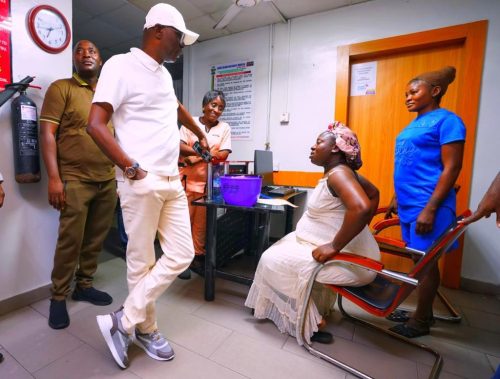Health
Peju Ugboma’s Death In Lagos Hospital Avoidable – Coroner

A coroner’s inquest into the death of a Lagos-based chef, Mrs Adepeju Ugboma, has determined that her death was avoidable and resulted from medical negligence.
The Coroner, Chief Magistrate Mukaila Fadeyi, gave the verdict on Thursday in Lagos.
The News Agency of Nigeria (NAN) reports that Ugboma died on April 25, 2021, after undergoing a hysterectomy (removal of the uterus) in a bid to remove fibroids.
The surgery was carried on April 23, 2021, at the Premier Medical Centre, Lekki, Lagos State.
Ugboma was transferred to Evercare Hospital due to complications from the surgery but was pronounced dead shortly after.
The coroner said that the surgery lacked due diligence on the part of the physicians who performed it.
According to him, an autopsy revealed that the deceased died from massive inter-abdominal bleeding, as 500ml of blood and 900ml of clotted blood were found in her abdomen.
Fadeyi said that the deceased’s medical history was poorly documented and that doctors of Premier Medical Centre failed to involve appropriate surgeons.
According to him, the absence of vital machines and the unwillingness of the doctors to address the issues immediately after surgery were questionable.
The coroner noted that the deceased was a wife and a dutiful mother whose dreams of a great future with her family were cut short.
He recommended that the code of ethics for medical practitioners should be tightly reviewed, adding that relevant agencies should do more sensitisation for members of the public to know their rights.
“State Governments should not limit funds to state-owned hospitals but extend funding to private hospitals.
“Government and medical regulators should ensure that the standards by World Health Organisation for Packed-Cell Volume (PCV) of 38 per cent before any surgical operation should be maintained,” he added.
The coroner said that he could not award damages as requested by counsel to the Ugboma Family, noting that he only carried out an inquest.
Fadeyi commended the widower of the deceased, Mr Ijeoma Ugboma, and his family for seeking the truth.
Reacting to the verdict, the counsel, Mr Babatunde Ogungbami, said: “The dead is gone and will have to rest in perfect peace but I love the doggedness of the husband to seek the truth, to seek a closure.
“He decided to see through, and today it becomes very clear that we really need to pay particular attention to medical services in Nigeria.
“Clearly, this has been confirmed as medical negligence.
“The woman died leaving her children, and she paid a lot to get the best medical services yet, what happened?
‘Government has to come up and look to see how to rejig the system.”
NAN reports that a pathologist, Dr Olugbenga Oluwole, had in 2021 testified that there was an ‘abnormal’ massive collection of blood in the deceased’s abdominal cavity.
NAN also reports that sometime in November 2021, the Medical and Dental Practitioners Council of Nigeria indicted three doctors at Premier Specialist Hospital, Lagos, with regard to the death of Ugboma.
The doctors are Akiseku Kazeem, Kelechi Renner and Motunrayo Amadu.
The indictment followed a petition by Mr Ijeoma Ugboma.
Health
Ramadan: Fasting Can Cause Kidney Problems, Affect Blood Sugar Level – Health Expert Warns
“Not drinking water for long hours can lead to dehydration, which can result in fatigue, headaches, dizziness, and even more serious complications like kidney challenges if not addressed.
“It is crucial for fasting individuals to stay hydrated during non-fasting hours,”

A Consultant Radiation and Clinical Oncologist at the Federal Medical Centre in Abeokuta, Ogun State, Bolaji Salako, has issued caution to Muslim faithfuls on the need to engage in healthy fasting exercise.
Salako said fasting during Ramadan can pose certain health risks, like kidney problems.
Speaking with the News Agency of Nigeria, NAN, in Ibadan on Monday, Salako said dehydration during fasting posed a lot of concerns due to the hot climate.
He warned that fasting not properly observed can affect blood sugar level for those battling with diabetes.
“Not drinking water for long hours can lead to dehydration, which can result in fatigue, headaches, dizziness, and even more serious complications like kidney challenges if not addressed.
“It is crucial for fasting individuals to stay hydrated during non-fasting hours,” Salako said.
He also identified nutritional deficiencies because fasting involved abstaining from food and drink during daylight hours, which can sometimes lead to imbalances in nutrient intake.
Salako charged those engaging in fasting to consume balanced diets during non-fasting hours.
He said that consuming diets that are not balanced could potentially lead to deficiencies in essential vitamins and minerals if not managed properly.
“Additionally, fasting can affect blood sugar levels, especially for individuals with diabetes.
“It is important for those with diabetes and other diseases like hypertension and cancer to work closely with their medical doctors to adjust their medication schedules and monitor their health conditions carefully during Ramadan,” Salako said.
Health
Antenatal, Child Delivery Services Not Free In Lagos-Owned Hospitals – Residents Lament

Some residents of Lagos have decried the non-implementation of the state government’s free antenatal and child delivery services at some General Hospitals and Primary Healthcare Centres in the state.
The residents spoke in separate interviews with the News Agency of Nigeria on Sunday in Lagos.
NAN reports that Lagos State Governor, Babajide Sanwo-Olu, had, during a media chat on February 22, announced sweeping interventions which the state would be implementing to reduce the effects of the current economic hardship on its citizens.
On health, Sanwo-Olu reintroduced a free child delivery programme for expectant mothers in all the state-owned General Hospitals and special maternity centres.
According to the governor, the state government will take up the cost of the child delivery, including caesarean section.
It would also reduce the cost of certain drugs, such as hypertension medication.
The residents said that the free antenatal and child delivery services were lip-service, stressing that the hospitals charged for every service rendered.
Mrs Funmilayo Olatunji, a trader who delivered at Ikorodu Health Centre, Ita-Elewa, said that delivery wasn’t free at the centre.
“I had normal delivery at the centre in February 2024. We paid N8,000 for child delivery fees, N10,500 for vaginal tear, and a carton of Maltina.
“I’m surprised to hear that the child delivery service was meant to be free at government facilities because the reverse was my experience,” she said.
Similarly, Mr Michael Adebiyi, whose wife delivered at Ikorodu General Hospital, Ebute, said he spent over N250,000 for caesarean section delivery and consumables at the hospital.
“My wife gave birth in February, and we paid for everything needed for the delivery from blood to caesarean section charges.
“Nothing was free; in fact, I’m still owing some people because I had to run around to source for the money.
“I was happy when I heard last year that expectant mothers would enjoy free child delivery services at government health facilities as part of relief measures to ease economic burden on families.
“The government should put mechanism in place to ensure that policies made truly impact on the lives of citizens,” he said.
Also, Mrs Stella Nwosu, a hairstylist, said that she switched to a trado-medical centre for antenatal and child delivery due to the high service charges.
“Sometimes in September, I went to Amuwo-Odofin General Hospital to register for antenatal service and was told to pay ₦30,000.
“We couldn’t afford it because every child care item is expensive and to feed is even a challenge. My mother-in-law took me to a traditional birth attendant, and I delivered my baby there,” she said.
A healthcare worker, who pleaded anonymity, told NAN that many pregnant women pay out-of-pocket for antenatal and delivery services at many government-owned facilities.
She opined that the programme required improved planning, compliance monitoring, and management for sustainability.
The healthcare worker noted that the economic situation of the country, which led to increased cost of products, especially medicines and healthcare services, would worsen the plight of couples with unplanned pregnancy.
She advised couples to take smart decisions, stressing that child care was a lifelong socio-economic experience that extends beyond access to free antenatal and child delivery services.
NAN reports that Gov. Babajide Sanwo-Olu, also in 2023, during the state’s Security Council meeting on July 31, 2023, had directed General Hospitals and Primary Health Care Centres to offer free antenatal care and child delivery services.
This is part of relief measures to ease the burden of the fuel subsidy removal.
The medical intervention will cover the cost of antenatal care, including the cost of registration and ANC clinics, as well as normal and cesarean section child delivery services.
It also seeks to increase access to quality maternal and child health services in line with the state government’s Universal Health Coverage attainment drive.
Health
Lassa Fever Outbreak In Benue Claims 9 Lives In IDPs Camps
“From our report so far, the IDP camp has a high population of rats. So, if the rats transmitting are within the IDP camps, it means that we need to work hard so we don’t have an outbreak that will be difficult to control,”

Benue State is currently struggling with a Lassa fever outbreak that has claimed the lives of nine individuals in the past two months.
The state epidemiologist, Dr. Sam Ngishe, revealed this to newsmen on Thursday, noting that some of the deceased were residing in Internally Displaced Persons (IDPs) camps.
“From our report so far, the IDP camp has a high population of rats. So, if the rats transmitting are within the IDP camps, it means that we need to work hard so we don’t have an outbreak that will be difficult to control,” the epidemiologist said.
He stated that 46 people, including health workers and IDPs, have been affected by the disease across the state.
Ngishe stated that four cases were identified among displaced persons at the Ortese IDP camp in the Guma Local Government Area, and that the disease had spread to seven of the 23 local government areas of the state, including Obi, Okpokwu, Gwer West, Makurdi, Guma, Gwer East, and Ukum.
He said, “nine deaths in confirmed cases and they have been buried in accordance with safe burial protocols across the various areas of the state where they hail from.”
The epidemiologist stated that, to address the outbreak, the state government had implemented safe burial protocols for the deceased and was intensifying efforts to reduce the fatality rate, which was currently above the national average of 10 percent.
Ngishe stated the importance of enhanced surveillance, risk communication, and community engagement to mitigate the spread of the disease.
He also pointed to the challenges posed by the IDP camp environment, including poor sanitation, overcrowding, and malnutrition, which contribute to the spread of infectious diseases.
“There is active surveillance going on in the community (housing Ortese IDP camp) as you know that the IDP camp is a cluster setting with very poor infection control in terms of poor sanitation, crowded environment and they have issues of malnutrition,” he noted.
-

 News2 days ago
News2 days agoCourt Affirms Justice Ojo As Chief Judge Of Osun State, Adeleke And Assembly Lose Case
-

 News2 days ago
News2 days agoAbuja: American School Writes EFCC, Seeks To Refund $760k Of Yahaya Bello’s Children Fees
-

 News1 day ago
News1 day agoPregnant Woman Gives Birth In Kidnappers’ Den In Enugu
-

 News1 day ago
News1 day agoNoise Pollution: Lagos Seals Five Churches, 19 Hotels
-

 News10 hours ago
News10 hours agoOne Dead, Two Injured As Explosion Rocks Abeokuta
-

 News22 hours ago
News22 hours agoEFCC Boss Appoints Nzekwe New Chief Of Staff, 14 Zonal Directors
-

 Politics1 day ago
Politics1 day agoNigerians Must Support President Tinubu As He Addresses Nigeria’s Many Challenges – Sola Adeyemo
-

 Politics6 hours ago
Politics6 hours agoI Won’t Govern Rivers On Bended Knees – Fubara









